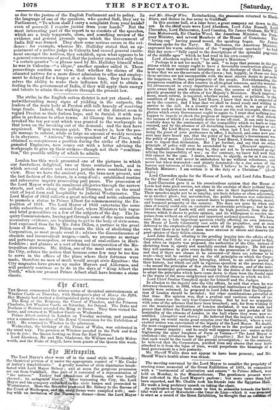London has this week presented one of the pictures in
which our forefathers delighted, two or three centuries back, and in which several stories and several periods were combined in one view. Here we have the ancient past, the bran-new present, and the last fashion of the future, in a coup dkeil ; •established routine and subversive inquiry proceeding pare passu. The procession of the Lord Mayor winds its cumbrous allegories through the narrow streets, and sails along the polluted Thames, bent on the usual visit of loyal form and hospitality to judicial Westminster. The Lord Mayor of 1852 collects a great meeting and noble subscribers to promote a statue to Prince Albert for commemorating the Ex- position of 1851. The Lord Mayor of 1853 entertains the same noble subscribers at the annual feast, where Ministers talk vague and brief generalities on a few of the subjects of the day. The In- quiry Commissioners, having got through some of the more random accusatory evidence, are beginning to get to the body of civic sense, best expressed thus far by Mr. John Dillon, a partner in the great house of Morrison. Mr. Dillon scouts the idea of abolishing the Corporation, as most people scout it ; advises the discontinuance of obsolete and inconvenient usages,—such, we presume as metage and porterage monopolies, or revenue out of coal-cellars in Hert- fordshire ; and glances at a sort of federal incorporation of the Me- tropolitan districts. Mr. Dillon, one of the most eminent men in the City, refutes the notion that because some few may be too fine to serve in the offices of the place where their fortunes were made, therefore no men of mark would accept civic dignities : the City magnates have grown up under Mayors and Aldermen, and will probably continue so to do in the days of " King Albert the Tenth," when our present Prince Albert shall have become a stone classic.


































 Previous page
Previous page